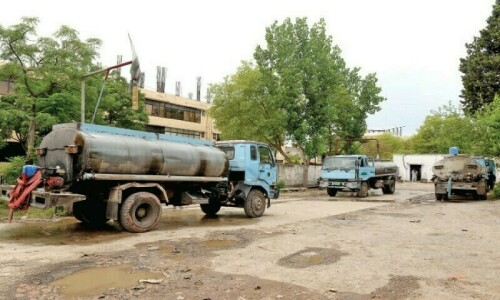The Federal Board of Revenue’s (FBR) digital refund settlement system – FASTER (Fully Automated Sales Tax e-Refund), which was launched to pay back the exporters’ sales tax refunds in 72 hours, isn’t fast enough after all. An FBR official informed a National Assembly special panel on finance last Thursday that the system was malfunctioning and shut down for three weeks.
The electronic refund settlement system was launched by government for quicker release of sales tax refunds after it withdrew the zero-rate facility – no sales tax, no refund – to five export industries in the budget for the present fiscal year under the $6 billion bailout package from the International Monetary Fund (IMF). According to the exporters, they had fresh liquidity of at least Rs24.5 billion stuck up in the new refund system in the first six months of this year to December.
The zero-rated regime was withdrawn on the pretext – and rightly so – that some textile producers were misusing the facility to avoid payment of sales tax on their domestic sales. The sales tax rate was also increased to 17 per cent on the entire supply chain.
‘Currently, foreign buyers, especially from Europe, are coming back to Pakistan with large orders. But we aren’t able to take full advantage of their interest owing to uncertain government policies’
Pakistan Textile Exporters Association patron-in-chief Khurram Mukhtar told this correspondent that the FBR had released refunds of Rs29.5 billion against total claims of Rs54 billion filed by exporters in the first half of the current fiscal year. “Out of 12,000 sales tax returns filed during the period, only 4,900 cases were processed,” he added. “The delays in the refund payments have confirmed our fears that the withdrawal of the zero-rated facility would intensify the liquidity crunch of exporting firms, especially of the small- and medium-sized exporters.”
The fresh refunds are in addition to Rs145 billion the government owes to exporters in sales tax, income tax and other refunds outstanding against it since 2012. “The delay in refund payments has squeezed a substantial portion of the exporters’ working capital, affecting their production,” Mr Mukhtar asserted.
He is of the view that the government would never be able to pay back their refunds unless it creates a separate window for collection of sales tax from the exporters and issuance of refunds.
“Without making the entire system transparent, there is little hope that FASTER or any other refund system will ever deliver.” He pointed out that the exporters could also not file their claims unless their previous refunds were cleared by the system. For example, the FBR has not cleared the sales tax returns of 155 exporters for the month of July. That means they have not been able to file claims for the refund of sales tax they had paid on their supplies since August!
The recent State Bank of Pakistan’s decision to enhance the funding for its Export Refinance Scheme by Rs100 billion to provide subsidised funds to exporters for meeting their working capital requirements has helped them but only to a little extent. “Currently, foreign buyers, especially from Europe, are coming back to Pakistan with large orders. But we aren’t able to take full advantage of their interest owing to the uncertain government policies.”
Government policy continuity and predictability is crucial to investment and business climate. Policy certainty is considered one of the basic prerequisites for improving domestic productivity, especially for the export sector. Frequent and sudden policy changes are especially considered bad for export businesses because even small changes in business regulations, withdrawal of incentive(s), etc impact adversely on the firms’ competitiveness and profitability, as well as their ability to confidently negotiate orders they are supposed to deliver in future.
Sadly, Pakistan’s performance in this area has always been extremely poor. The overall export regulatory framework has mostly, if not always, been defined by frequent policy shifts and U-turns and is described by exporters to be one of the important factors for lack of growth in exports according to the country’s potential.
A former All Pakistan Textile Mills Association chairman, who requested anonymity, was critical of the government for its failure to give a long-term policy framework for exporters. “We cannot work in an uncertain environment; it affects our ability to negotiate our prices with the importers. The frequent policy changes have already resulted in the erosion of our international competitiveness and closure of a number of units. The government must formulate a long-term export policy for a minimum of five years. The policy should clearly state incentives government is willing to give to different exporting industries, the energy prices for exporters, separate tax regime and so on. Unless we have long term policy no one is going to make fresh investment in export-oriented industries.”
Published in Dawn, The Business and Finance Weekly, March 9th, 2020














































